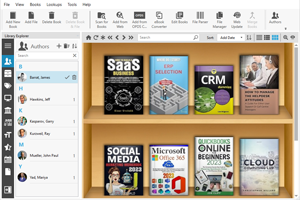4 books on Industrial Automation software [PDF]
Updated: February 09, 2024 | 18 |
Books on Industrial Automation software are crucial references for startups in the Industrial SaaS industry, providing a comprehensive understanding of the technologies, methodologies, and best practices essential for developing efficient and adaptive solutions for industrial automation. These publications cover a wide range of topics, including process control, machine learning, IoT integration, and predictive maintenance, equipping startups with the knowledge needed to create user-friendly, scalable, and cost-effective industrial automation software. They often include practical case studies and insights from experienced professionals in the industrial sector, enabling startups to learn from successful implementations and stay updated on emerging trends such as edge computing and AI-driven manufacturing processes.
1. Industrial Automation: Learn the current and leading-edge research on SCADA security
2019 by Vikalp Joshi, Manoj Singh Adhikari, Raju Patel, Rajesh Singh, Anita Gehlot

Automation, a process aimed at executing controlled activities with minimal human intervention, is a field witnessing extensive research and academic interest. This book delves into the realm of industrial automation, elucidating its fundamental concepts to aid engineering students in comprehending its intricacies. With a distinctive feature of incorporating multiple-choice questions, the book serves as a valuable resource for students preparing for competitive exams and interviews. Encompassing the roles of SCADA and PLC in automation, this book caters to the expanding scope of automation, providing a comprehensive understanding for those keen on exploring this dynamic field.
Download PDF
2. Industrial Automation: Hands On
2013 by Frank Lamb

"Industrial Automation: Hands-On" serves as a comprehensive guide to understanding industrial automation concepts, terminology, and applications, making it an invaluable resource for those engaged in automated machinery design and utilization. The book places a strong emphasis on control systems and provides extensive coverage of related topics, including machine building, mechanical engineering, devices, manufacturing business systems, and various job functions within an industrial setting. Featuring detailed charts and tables as practical design aids, the book is suitable for both beginners and experienced automation professionals. The content spans automation and manufacturing, key concepts in automation, controls, machinery design, documentation, components, hardware, machine systems, process systems, automated machinery, software, occupations, trades, industrial and factory business systems (including Lean manufacturing), machine and system design, and various applications.
Download PDF
3. Modern Industrial Automation Software Design
2006 by Lingfeng Wang, Kay CHen Tan

This book primarily addresses software development in the realm of real-world industrial automation applications, employing a hands-on approach with cutting-edge technologies. It elucidates key concepts through clear examples, spanning from straightforward to more intricate problem domains, all rooted in actual industrial challenges. Serving as a valuable reference for practicing engineers, it also stands as an updated resource for researchers, offering insights into the application of emerging technologies in modern industrial contexts.
Download PDF
4. Manufacturing Automation at the Crossroads: Standardization in CIM Software
1993 by Louis-François Pau, Jan-Olaf Willums

In the manufacturing industry, information technology has emerged as a crucial discipline, playing a pivotal role in modern production. However, the intricacies of contemporary manufacturing processes have created a dependency on rapidly advancing computer-based support technology. The proliferation of diverse data solutions and the utilization of incompatible products across various factory locations have given rise to what is commonly known as "islands of automation." While these individual islands may offer significant value, integrating them to streamline factory functions poses considerable challenges. The intricate nature of modern factories imposes stringent requirements on systems integrators seeking to address these integration issues.
Download PDF
How to download PDF:
1. Install Google Books Downloader
2. Enter Book ID to the search box and press Enter
3. Click "Download Book" icon and select PDF*
* - note that for yellow books only preview pages are downloaded
1. Industrial Automation: Learn the current and leading-edge research on SCADA security
2019 by Vikalp Joshi, Manoj Singh Adhikari, Raju Patel, Rajesh Singh, Anita Gehlot

Automation, a process aimed at executing controlled activities with minimal human intervention, is a field witnessing extensive research and academic interest. This book delves into the realm of industrial automation, elucidating its fundamental concepts to aid engineering students in comprehending its intricacies. With a distinctive feature of incorporating multiple-choice questions, the book serves as a valuable resource for students preparing for competitive exams and interviews. Encompassing the roles of SCADA and PLC in automation, this book caters to the expanding scope of automation, providing a comprehensive understanding for those keen on exploring this dynamic field.
Download PDF
2. Industrial Automation: Hands On
2013 by Frank Lamb

"Industrial Automation: Hands-On" serves as a comprehensive guide to understanding industrial automation concepts, terminology, and applications, making it an invaluable resource for those engaged in automated machinery design and utilization. The book places a strong emphasis on control systems and provides extensive coverage of related topics, including machine building, mechanical engineering, devices, manufacturing business systems, and various job functions within an industrial setting. Featuring detailed charts and tables as practical design aids, the book is suitable for both beginners and experienced automation professionals. The content spans automation and manufacturing, key concepts in automation, controls, machinery design, documentation, components, hardware, machine systems, process systems, automated machinery, software, occupations, trades, industrial and factory business systems (including Lean manufacturing), machine and system design, and various applications.
Download PDF
3. Modern Industrial Automation Software Design
2006 by Lingfeng Wang, Kay CHen Tan

This book primarily addresses software development in the realm of real-world industrial automation applications, employing a hands-on approach with cutting-edge technologies. It elucidates key concepts through clear examples, spanning from straightforward to more intricate problem domains, all rooted in actual industrial challenges. Serving as a valuable reference for practicing engineers, it also stands as an updated resource for researchers, offering insights into the application of emerging technologies in modern industrial contexts.
Download PDF
4. Manufacturing Automation at the Crossroads: Standardization in CIM Software
1993 by Louis-François Pau, Jan-Olaf Willums

In the manufacturing industry, information technology has emerged as a crucial discipline, playing a pivotal role in modern production. However, the intricacies of contemporary manufacturing processes have created a dependency on rapidly advancing computer-based support technology. The proliferation of diverse data solutions and the utilization of incompatible products across various factory locations have given rise to what is commonly known as "islands of automation." While these individual islands may offer significant value, integrating them to streamline factory functions poses considerable challenges. The intricate nature of modern factories imposes stringent requirements on systems integrators seeking to address these integration issues.
Download PDF
How to download PDF:
1. Install Google Books Downloader
2. Enter Book ID to the search box and press Enter
3. Click "Download Book" icon and select PDF*
* - note that for yellow books only preview pages are downloaded


